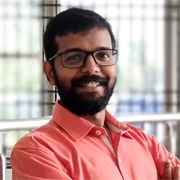As an altar boy, Judson grew up hearing the story of Jesus healing a leper often during the holy masses and prayers. The story ran deep into the young boy's mind. Later, when an opportunity came to him to take care of the people suffering from the severe disease, he grabbed it without any hesitation. It was only the beginning. Today, he feeds thousands of homeless people in Kerala's Kochi everyday.
A native of Edakochi in Kerala's Ernakulam, M X Judson runs an organisation called Sehion Preshitha Sangham which is engaged in feeding and taking care of the destitute and other marginalised people in society. The trust was launched a few years ago, but Judson's exemplary service for the poor has a history of 32 years.
With the Covid crisis making life more difficult for the poor, Judson and his team have been more active than ever before. The trust distributes thousands of food packets to the needy everyday, all with the support of some large-hearted people.
Pious and compassionate to the core, Judson wanted to become a priest. However, he couldn't complete his ecclesiastical studies due to some family situations. He was, but, destined to be a part of the Church throughout his life.
In 1988, Judson was working as a driver of a bishop of the Cochin diocese. The diocese runs a hospital for leprosy as part of the Cochin Urban Leprosy Treatment & Education Scheme (CULTES). When Judson came to know that there was a vacancy of a gardener in the hospital, he felt an urge to take up that. It was a job many would not opt. Judson's duties at the hospital were not restricted to maintaining the garden. He had to drive the hospital's ambulance and take care of the patients.

“One day, Fr Dominic, who was the director of CULTES, asked me if I could bring a patient to the hospital. He said I had to go there all alone. When I went to pick the patient, I found in a very difficult condition. She was isolated and abandoned in a room. No one had gone near her for a long time. There were unclean plates lying in the room. The room was stinking. I took her to the hospital and cleansed her. However, she died that evening,” Judson told Onmanorama.
Taking care of people suffering from leprosy, Judson encountered many such experiences. However, the most defining moment of his life happened the day he met John, who was discharged from the hospital, on the streets.
“It was on June 29, 1997. I found John a day after he was discharged from the hospital. He told me he was hungry. He said had had no food since he left the hospital. His family or anyone else was not willing to accept him even after he was cured, because of the taboos over the disease. That day, I bought him food from a restaurant. I also told him to wait for me at the same spot the next day. I brought him a parcel of food from my home the next day. The next day, another person called Antony was also waiting for me along with John because he knew I would bring some food,” Judson recalled.
The number of people, homeless and abandoned, waiting for Judson kept rising everyday. As the number of the needy rose, Judson depended on his brothers and friends for arranging more food packets.
On January 1, 2003, Judson opened a community kitchen named Sehion Oottushala at Chirakkal. “On the inaugural day, 80 people came for food. They were even from distant places. The same year, we started eight more community kitchens in various places in and around Kochi. Now the Trust runs 25 community kitchens,” he said.
However, with the Covid breakout, Judson shut all the units and opened a centralised community kitchen at Edakochi. Cooking starts at 4.30 am in the kitchen. By noon, volunteers of the Trust take food packets to various parts of Kochi. There are around 300 volunteers associated with the Trust.

Asked how he manages to find the funds to run the services, Judson said, “I cannot express my gratitude to the people of Kochi in words for helping me.” People support with money and also sponsor the expenses of a day's food on account of special occasions such as birthdays, weddings and death anniversaries.
Judson said his activities had the support of the Cochin Diocese right from the beginning. Msgr Antony Kochukariyil is the patron of the Trust. Dr Arun Oommen, a neurosurgeon in a private hospital in Kochi, is the managing trustee while Rancy Ambrose is the treasurer.
Judson is so grateful to Dr Oommen for his immense support. Judson said he has not been bothered about anything after Dr Oommen joined him four years ago.
The Trust also takes out a Karunya Yathra (Journey of Compassion) towards the northern and southern ends of the state a couple of times every year. During the trips, the volunteers bathe and cleanse the destitute they come across. They are also given food and clothes.
This programme is done using a specially designed van sponsored by the Muthoot M George Foundation. Other services done by the organisation include providing medical aid to the needy, public place cleaning and awareness programmes . The organisation has a youth wing too which is instrumental in organising various activities.

Judson's wife Mary Rani and sons Tom Renjith and Xavier Rejan are also active in the trust's services. Judson had to work overtime as a driver at the fishing harbour to pay his debts as he devoted more time for his serving the poor.
On what drives him forward, Judson says he is only doing the service of God. “I'm only one among the many,” he said.

















